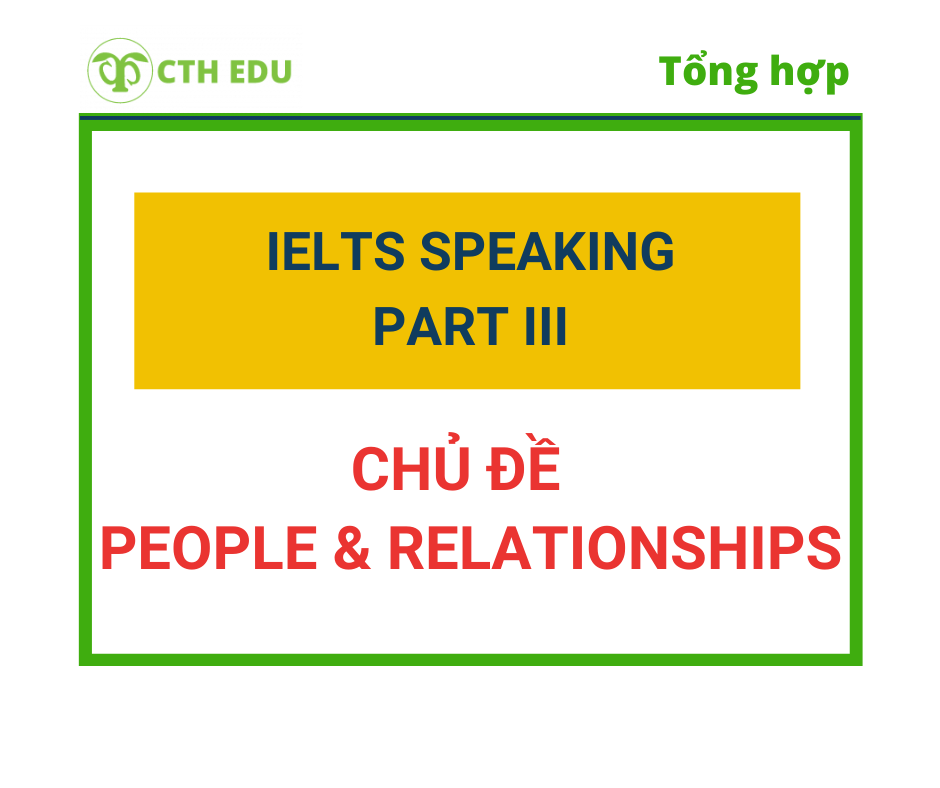CTH Edu tổng hợp các câu hỏi thường gặp và gợi ý một số câu trả lời cho chủ đề Con người và các mối quan hệ – People & Relationships của bài thi IELTS Speaking Part 3.
Câu hỏi thường gặp
1.1. Theo Speaking for IELTS
1.1. Modern families
- In what ways have families changed in the last hundred years?
- Should we rely heavily on our families or is it better to try to be independent?
- The elderly are sometimes considered the wisest members of society. What do you think we can learn from them?
1.2. Friendship
- What do you expect from a good friend?
- Are friends as important to you as family?
- Do you think friendships change as we get older? How?
1.3. Childhood
- Do you think people often idealise their childhoods?
- How does a person’s childhood influence what kind of adult they become?
- When does a child become an adult in your view?
1.4. Upbringing
- Do you agree with the saying’ children should be seen and not heard’?
- Is it good for children to be exposed to frightening and sad experiences or should they be protected from these as far as possible?
- Are children in your country generally well brought up?
2. Theo IELTS Liz
Family
- Is family important in your country?
- How has the size of the family changed in the last few decades in your country?
- How do you think the family will change in the future?
- What role do grandparents play in the family in your country?
- Who do you think should be responsible for the care of the elderly, the family or the government?
3. Theo IELTS Online Tests
3.1. Leaders
- Do you think people are born to be leaders? Why/ Why not?
- Can leadership skills be taught? Why/ Why not?
- Why are elected politicians often so unpopular?
- What should a leader do to remain popular?
- Do you think unelected heads of state are a good idea? Why/ Why not?
- In your opinion what qualities a political leader should have?
3.2. Famous people
- Do you think that famous people are generally happier than ordinary people?
- What qualities does a person need to have in order to be famous?
- Is it easier or more difficult to achieve fame today than in your grandparents’ time?
- Describe the ways that famous people influence the public.
- Do you think more is expected from famous people than ordinary citizens?
- What types of people become famous in your country? Do you want to be famous?
Gợi ý câu trả lời
In what ways have families changed in the last hundred years?
In Western countries, I would say families have become more widely dispersed and less
close. People travel more, and then end up living far from their families. I think this is a
shame because it means there is a breakdown of communities. I also think that because
families are spread over a wider geographical area, elderly people tend to be forgotten
and usually live on their own.
Should we rely heavily on our families or is it better to try to be independent?
People seem to like living independently from each other these days, but I do wonder if
that’s the best way. Relying on people is seen as a weakness by some, I think. However,
having family nearby is invaluable when you have children, in my opinion. Who else can be called on to babysit at a moment’s notice?
The elderly are sometimes considered the wisest members of society. What do you think we can learn from them?
Oh, an immense amount! They’re our living link with the past – of a family, a region, a
country. They’re the keepers of local traditions, for example, and they provide a sense of
identity to younger generations. It often seems to me that older people had harder lives and lived through more interesting periods in history, so I always enjoy asking my grandparents about their childhoods and how things have changed, Also, because they’ve got more life experience, older people are very well placed to give good advice on, well, any topic.
What do you expect from a good friend?
For me, a good friend has to be reliable. I can’t stand being stood up or having my emails
and texts ignored. As well as that, a friend should be someone you can have good fun with. There are many things in life to be serious about, but friendship shouldn’t be one of them. I also believe that opposites attract, in friendships just as in romance, so a good friend will most likely be very different from you in many ways.
Are friends as important to you as family?
No, I wouldn ‘t say so. Friends come and go, but family are always there, whether you like
it or not. You can even be rude to your family – not that it’s advisable, of course! – and they will forgive you. But sometimes you ‘ve known a friend for so long they can become like a family member – you can really be yourself with them and you may even argue quite often, like siblings do.
Do you think friendships change as we get older?
Well, I definitely find that I have less in common with some friends than I used to. I
sometimes wonder what we used to find to talk about. And so you often grow apart from old school friends or old colleagues. The people I feel I have most in common with are friends I met at university. I’m not sure why but we somehow always have lots to talk about.
Do you think people often idealise their childhoods?
Certainly they do. The older we get, the more nostalgic we get about the past. It’s only
normal. And why should we dwell on the negatives? I don’t think it does any harm to idealise a bit if it makes us happy to remember things in a more positive light. The only danger is that it may make us unhappy with our current lots to believe that everything was so much better back then.
How does a person’s childhood influence what kind of adult they become?
Well, I suppose the adult you become is influenced by three main factors: firstly, your
childhood, that is ‘nurture’; then, your genes, that is ‘nature’; and last but not least, the
choices you make as an adult. To my mind, of all three, nurture has the greatest impact.
They’ve conducted research on twins who were separated at birth and, while there are
undoubtedly many similarities between them, they are also very different in many key ways:their success in the world of work, their relationships with other people. I think all this is influenced by the role models we have throughout our childhoods.
When does a child become an adult in your view?
That’s a difficult question to answer and all societies grapple with this issue. It is, of course, critical for the criminal justice system to define an ‘adult’ correctly, or at least try to, because if somebody commits a crime as a child, they get treated more leniently than if they commit a crime as an adult. So I suppose you have to decide when you think people become fully responsible for their actions. I wouldn’t want to be the one making that decision. I just don’t know.
Do you agree with the saying ‘children should be seen and not heard’?
I’m assuming this means that children should respect their elders and not create
havoc by being noisy and answering adults back. I have some sympathy with this view.
However, moderation is usually the best course to take in all things, as with upbringing.
Children should respect their elders, which involves doing as they’re told. Too many
children nowadays think they run the household, making demands, etc. However, it is
also true that a child is part of the family, too and also deserves respect. I think this
means they should be allowed to express their points of view and they should be listened
to and consulted. Ifs a fine balance, I suppose.
Is it good for children to be exposed to frightening and sad experiences or should they be protected from these as far as possible?
I don’t think they should experience too many sad or terrifying experiences, if it can be
helped. Nevertheless, what is very useful for teaching children about these darker sides of
life without scarring them is stories. In stories they can learn about evil and the dangers
in the world around them, but in a controlled way where the ‘baddies’ are punished an.d
everyone ends up happy. This gives them a focus for the fears that all children have but it is a fictional one so doesn’t upset their peace of mind.
Are children in your country generally well brought up?
My instinct is to say ‘no’ because you see many misbehaving.children when you ‘re out
and about. In reality, there are probably many more well brought up children than badly
brought up ones, it’s just that the good children don’t attract your attention as much.





